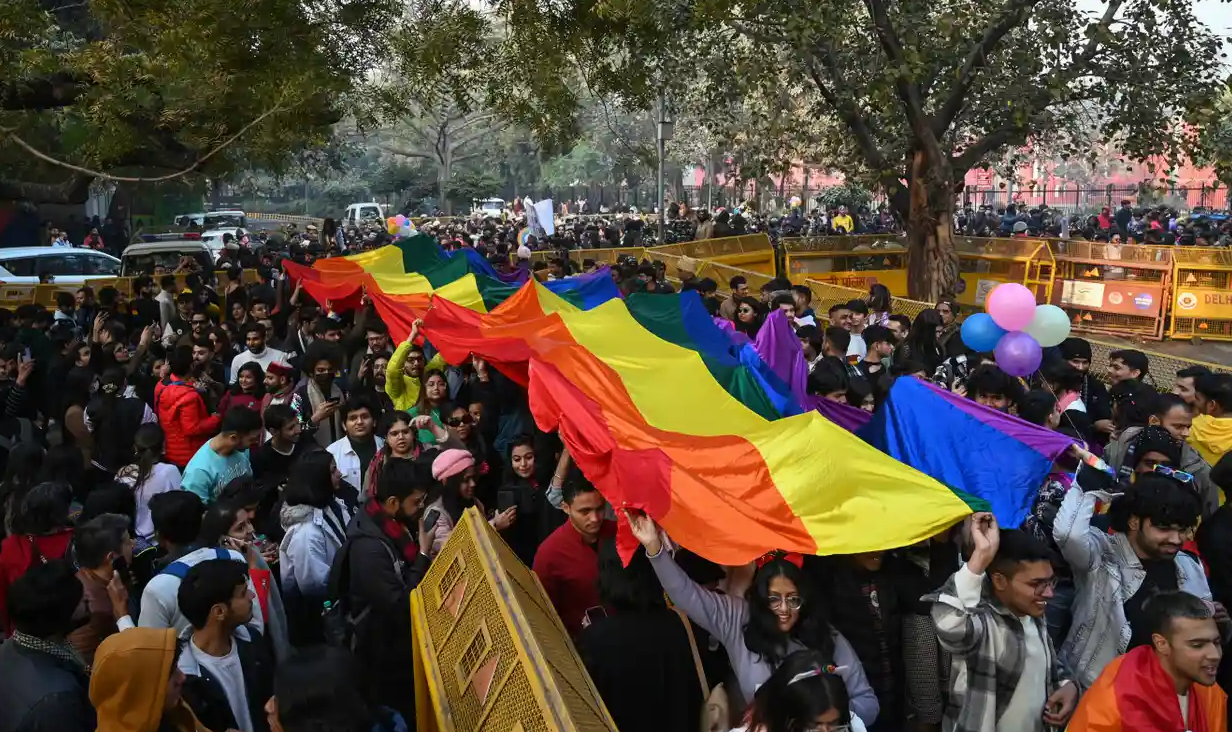Indian Supreme Court Set to Hear Petitions to Legalize Same-Sex Marriages
Activists and allies come out supporting the LGBTQ community as the Indian Supreme Court decides on the status of same-sex marriage. Source: AP.
A five-judge bench of the supreme court of India headed by the Chief Justice of India, Dhananjaya Y. Chandrachud is currently hearing a petition to legalize same-sex marriages. The petition, which has been spearheaded by partners Supriya Chakraborty and Abhay Dange, and other LGBTQ activists, is staunchly opposed by Prime Minister Narendra Modi’s right-wing government.
Indian legislation has had many back and forths about conferring rights to the LGBTQ community.
During colonial rule and after independence, India had laws criminalizing homosexuality. A turning point came in 2009 when the Delhi High Court, responding to a petition by the Naz Foundation, ruled that “...section 377 of IPC in so far as it criminalizes consensual sexual acts of adults in private is violative of Articles 14, 21 and 15 of the Constitution.” This verdict, effective only in the national capital, legalized sexual relationships between adults regardless of sex or gender identity.
In 2013, a two-judge bench of the Supreme Court of India revoked the high court order and criminalized homosexuality, with the appellant astrologer and priest Suresh Kumar Koushal arguing that legalizing homosexuality would take the country in the “wrong direction.” However, another bench of the Supreme Court in 2018 overturned the 2013 verdict, with Supreme Court Justice Indu Malhotra saying, “History owes an apology” to the LGBTQ community.
The latest plea in the Supreme Court, filed by Bhawna and Kajal, who were forcibly separated from each other by their families, asserts that the state should acknowledge same-sex marriage. Several petitioners have argued that legalizing same-sex marriages is not only a question of principle but also has ramifications on things like adoption, finances, and alimony.
Much of South Asia, and beyond, fails to provide legislative protection and rights to the LGBTQ + community. Source: CFR Research, Pew Research Center, Marriage Equality USA, ILGA
The government of India, strongly opposing this move, has argued that same-sex marriage is incompatible with the traditional “family unit” consisting of “...husband, a wife and children,” and that the bid for legalization is “urban elitist.” Considering the Bharatiya Janata Party’s conservative vote bank, their position on this matter is unsurprising. However, in 2019, the BJP passed bills championing transgender protection and rights. Their parent organization RSS has also come out in support of LGBTQ rights, leaving many disappointed with their stance in court.
The court, as a whole, has been dismissive of the government’s arguments. Justice Chandrachud rebuked the Centre - a colloquial synonym for the Central Government of India, which is currently led by Modi’s administration - saying they had no data to support the claim that only a small segment of society favored this legalization, and in all likelihood, they will pass an order in favor of the LGBTQ community. If this landmark verdict goes through, it would make India the 34th country globally and the first South Asian nation to give sanction to same-sex marriages.
However, the worrying lack of legislative and executive support for same-sex marriages leaves this order open to modifications in the future. The government may decide to introduce a bill in Parliament to reverse the court’s verdict. It’s also probable that this matter will be brought up in front of a larger supreme court bench in the future, which has the power to overrule the earlier judgment.
Only time will tell.


